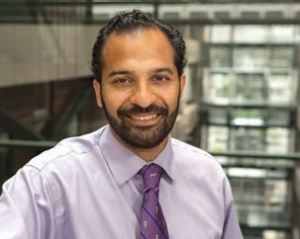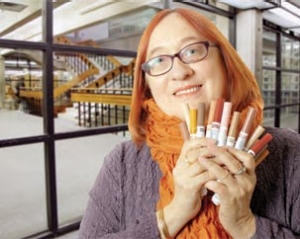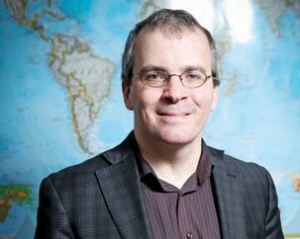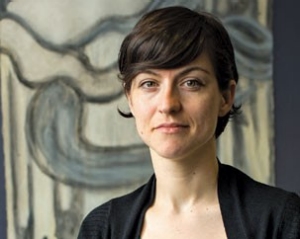Vivek Venkatesh, MA 03, PhD 08, is one busy guy. He’s associate dean, Academic Programs and Development, at Concordia’s School of Graduate Studies, acting director of the Centre for the Study of Learning and Performance, director of the Graduate Certificate in University Teaching and associate professor in the Department of Education.
Originally from India, Venkatesh came to Canada by way of Singapore. He has a layered understanding of what it means to move between countries, languages and cultures. He studied French as a schoolboy, married a woman from Paris and is now pleasantly surprised to discover himself able to deliver keynote addresses and white papers in la langue de Molière. “I’m an unabashed proponent of the interculturalism Quebec is known for,” he says.
As successful as his personal immigration experience has been, some of his research looks at the flip side. “It focuses on how digital media is used in the creation, dissemination and propagation of online hate including misogyny, homophobia and racism in multicultural societies,” he says.
Venkatesh wants to “sensitize Canadians to the deleterious effects of hate speech,” he says. To this end, he received a two-year Public Safety and Emergency Preparedness Canada grant — under their Kanishka Project, a five-year $10 million initiative to invest in research on terrorism and counterterrorism, including how to prevent and counter violent extremism.
Venkatesh and his team are championing the SOMEONE project, an acronym for SOcial MEdia educatiON Every day. The vision: “To build awareness, create space for dialogue and combat online hate.” An online portal of learning materials — multimedia, digital and social — will be created to sensitize Canadian students, parents, teachers and the general public and designed to prevent hate speech inciting violence and violent extremism. The goal is to foster resilience and develop digital literacy and critical thinking. The developed material — blogs, podcasts, videos, comic books, graphics and other media — will help educators, community members and government stakeholders encourage the use of social media to counter hate speech.
The project brings together principal investigators from each of Concordia’s four faculties and other Canadian- and American-based researchers. Collaborators include experts in consumer consumption and cultural theory, peace education, terrorism risk assessment, textual analysis, psychoanalytics, feminism and a host of other specialties.
SOMEONE grew out of concerns about social media and the propagation of hate online — an awareness that arose during some of Venkatesh’s other research on extreme metal music. Venkatesh stresses the fine line that exists between building a culture of respect for civil liberties and freedom of expression and an anything-goes mentality. Currently he’s become interested in how elements of Nordic culture, Canadian history and assimilation stories are incorporated in the extreme metal art form. Racist ideals are propagated through the metal scene, and so linguistic analysis of Reddit and Facebook chatter is in his sights. Which means among his latest collaborators are people who study online discourses, as well as the history of societies in Scandinavia and North America.
“I’ve been a metalhead as long as I can consciously remember, probably 30 years,” he says. “We need to better understand how hateful messages are propagated and interpreted by various members of these music scenes.”


 One research focus of Vivek Venkatesh, associate professor in the Department of Education (among other roles), is messages of hate found in metal music culture. He recently spoke at the industry conference of the Inferno metal festival Norway.
One research focus of Vivek Venkatesh, associate professor in the Department of Education (among other roles), is messages of hate found in metal music culture. He recently spoke at the industry conference of the Inferno metal festival Norway.
 Department of Communication studies professor Lorna Roth is in the process of writing an e-book, Colour balance: skin tones technologies product. It will examine the history of the colour “flesh,” its multiple meanings and complex place in societies.
Department of Communication studies professor Lorna Roth is in the process of writing an e-book, Colour balance: skin tones technologies product. It will examine the history of the colour “flesh,” its multiple meanings and complex place in societies.
 Department of Psychology associate professor Andrew Ryder is also an affiliate researcher within the culture and mental health research unit At Montreal’s Jewish General Hospital. His research includes looking at the relationship between individuals and their cultural context.
Department of Psychology associate professor Andrew Ryder is also an affiliate researcher within the culture and mental health research unit At Montreal’s Jewish General Hospital. His research includes looking at the relationship between individuals and their cultural context.
 Mireille Paquet, assistant professor in Concordia’s Department of Political science, looks at Canadian immigration policies. She’s co-director of the university’s Centre for the evaluation of immigration policies, created in 2013. “We’re not interested in whether a policy is ‘good’ or ‘bad,’ but in studying what governments actually do, and how to measure the impacts of these policy changes.”
Mireille Paquet, assistant professor in Concordia’s Department of Political science, looks at Canadian immigration policies. She’s co-director of the university’s Centre for the evaluation of immigration policies, created in 2013. “We’re not interested in whether a policy is ‘good’ or ‘bad,’ but in studying what governments actually do, and how to measure the impacts of these policy changes.”